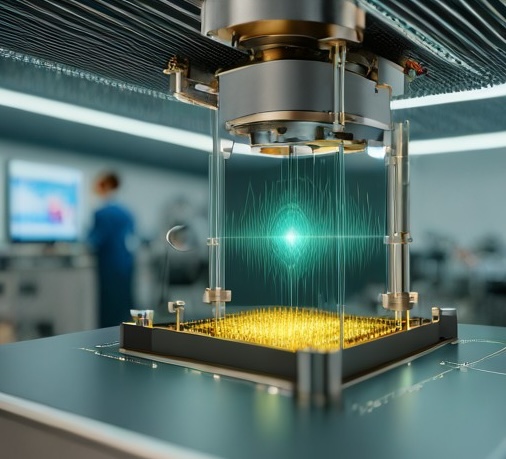🏙️ Location: Bordeaux (France) and San Sebastian (Spain)
🎓 Education: Masters degree in Physics or Engineering
The research groups of Prof. Nicolas Bachelard (University of Bordeaux, Bordeaux, France) and Prof. Gabriel Molina-Terriza (Materials Physics Centre, San Sebastian, Spain) are offering a PhD project in co-tutelle.
The successful candidate will develop her or his research in both groups and will receive a PhD degree from both Universities. Profs. Bachelard and Molina- Terriza work on optical levitation, quantum imaging and are developing a set of other quantum technologies in their laboratories with special interest in quantum-enhanced sensors
What about
Optical levitation is a subfield of optomechanics, in which a small particle is trapped in a vacuum chamber at the focal spot of a laser focused through a microscope objective [1]. The laser beam produces an optical force equivalent to a mechanical spring and the system can be regarded as a simple mass-spring resonator displaying pristine vibrational oscillations in the kHz regime. Because levitated systems outperform other types of mechanical resonators, they are currently exploited to achieve high-sensitivity metrology, detect gravitational waves or search for dark matter. Yet, despite their simplicity, levitated systems provide a remarkable interaction between the mechanical motion of the particle and the light field, which can be harnessed to study and control quantum properties of material particles.
To display such properties, the particle must be cooled down to its motional quantum ground state, which requires to monitor the motion of the particle with the highest precision possible. Typically, such monitoring is performed using a coherent (i.e. classical) light produced by a conventional laser. The precision one can expect from coherent states is intrinsically limited by the shot noise, which is inherited from the Poissonian statistics of the impinging photons. As a result, cooling levitated objects to their ground state remains a formidable task [2]. Interestingly, recent works in the field of quantum imaging have demonstrated that the performances of coherent light can be outperformed by quantum light. For instance, shot noise can be suppressed using pairs of entangled photons [3]. There, a photon of the pair (the signal) serves to image a target, while the second one (the idler) serves as a reference. As shot noise identically affects both photons, subtracting signal and idler suppresses the shot noise, while leaving the image of the target untouched.
In this PhD, the candidate will experimentally harness pairs of entangled photons to monitor for the first time the motion a levitated nano-particle below the quantum shot-noise limit. Specifically, the student will first develop a source of entangled-photon pairs [4] and then deploy it in a levitation setup. At last, this new monitoring scheme will serve to cool levitated nano-objects towards their motional quantum ground state.
[1] Millen et al., Reports on Progress in Physics (2020). [2] Magrini et al. Nature (2021). [3] Brida et al. Nature Photonics (2010). [4] Büse et al. Physical Review Letters (2018).
We offer
Both research centres are equal opportunity working environments and female researchers as well as people from minority groups are especially encouraged to apply. The selected researcher will work within a friendly, inclusive and open environment. Supported by two research groups, she or he will be led to acquire theoretical and experimental skills on optomechanics, levitation and quantum optics. In Bordeaux, the group will also provide an interdisciplinary working atmosphere, through Naquidis Center, the Innovative Center for Disruptive Quantum Products.
If you are a passionate student with a strong interest in the field, we encourage you to submit your CV’s, a letter of introduction and the contact details of two potential persons that can provide letters of reference to the following email addresses: gabriel.molina.terriza@gmail.com, nicolas.bachelard@gmail.com. The email should have the following subject: [Cotutelle PhD proposal].




